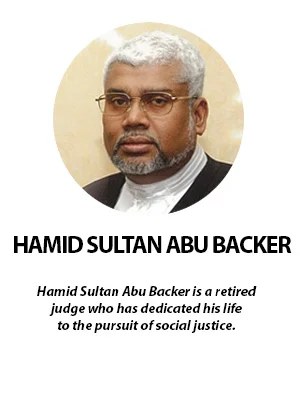
A foundling is an infant abandoned by its parents, often in a public place, and found by a stranger.
Social justice demands that such infants are entitled to receive immediate protection under the Federal Constitution, especially by virtue of Articles 5 and 8.
Article 5 reads that no person shall be deprived of life or personal liberty save in accordance with the law. Article 8 provides that all persons are equal before the law and entitled to equal protection of the law.
The rights conferred by these provisions are not just restricted to Malaysian citizens, as per decided cases.
It is also an elementary principle of law that when it comes to citizenship the constitution cannot be interpreted in isolation.
When constitutional relief is sought, it is necessary that the constitution be read together with related laws, such as the Courts of Judicature Act 1964 and the Rules of Court 2012.
Where proof is required, the Evidence Act 1950 and the relevant principles of law must be invoked.
Article 14 of the Federal Constitution, read with the Second Schedule, provides that the following persons born in Malaysia are citizens by operation of law:
- those with at least one parent, who at the time of the birth, is either a citizen or permanent resident [Second Schedule, paragraph 1(b)]
- those not born a citizen of any other country [Second Schedule, paragraph 1(e)].
Now, let’s consider the position of foundlings.
Being an abandoned child, a foundling’s parents are not available to prove their own citizenship so as to secure the status of citizen for the child. For obvious reasons, the child is itself in no position to prove the citizenship of its parents.
Thus, the only option available to the child is under paragraph 1(e) of the Second Schedule. Again, here, an abandoned infant has no means of proving it was born within the Federation and that it is not a citizen of any other country.
This is where the law of presumption and evidence comes into play.
An infant found in the Federation must be entitled to the benefit of a presumption that it was born here. It must also be presumed not to be the citizen of any other country.
It is what is known in law as common-sense jurisprudence. Common sense tells us that laws are, at least for the most part, reasonable directives publicly promulgated by lawmakers for the good of the whole community.
It is reasonable to expect that a foundling will not be able to prove it is a citizen. In such circumstances, the foundling should be entitled to rely on a presumption that it was born in the country.
It is also reasonable to expect that the government would be in a far better position to prove by evidence that an infant was not born within the Federation and is the citizen of another country.
What that means is that the burden of proof should be on the government to rebut presumptions made in favour of the foundling.
In my view, that means the government must accept responsibility for every infant found within Malaysia’s borders who has not been claimed by anyone and lacks a visible record of birth unless it can prove that the child is a citizen of another country.
If the government can prove that the child is a citizen of another country, then it is duty-bound to hand it over to that other country’s authorities to look into its wellbeing.
In my view, it would be utterly unconscionable, irresponsible and a violation of basic human rights and decency for the government to disclaim responsibility altogether for foundlings.
The government should not throw up hurdles and subject applications for citizenship by foundlings or their adoptive parents to years of hardship and undue delay.
Instead, the moment a foundling is brought to the attention of the authorities, the government should issue a foundling certificate granting the child temporary residence. All government agencies should then provide the foundling with the privileges of a citizen as per ministry regulations.
In Lee Hoo Boon v Public Prosecutor (1966), a person born in the state of Johor was treated as Johor national for purpose of prosecution under the Internal Security Act during the Indonesia-Malaysia confrontation. In that case, the Federal Court presumed that whatever the accused’s position as regards citizenship, he was at all times a Johor national by reason of his presence in the state.
That case involved attaching some form of penalty to the accused, but the principle should also apply to attach benefits to foundlings.
After all, humanity is the core value of every religion practised in this country.
The Federal Constitution is anchored on the recognition of religion.
Thus, in my view any form of dishonour or hardship inflicted on foundlings is an abuse of both our religious beliefs as well as the Federal Constitution.
It is time our executive, legislature and judiciary act as per their oaths of office to preserve, protect and defend the constitution by giving foundlings their rights in accordance with the law. - FMT
The views expressed are those of the writer and do not necessarily reflect those of MMKtT.
No comments:
Post a Comment
Note: Only a member of this blog may post a comment.